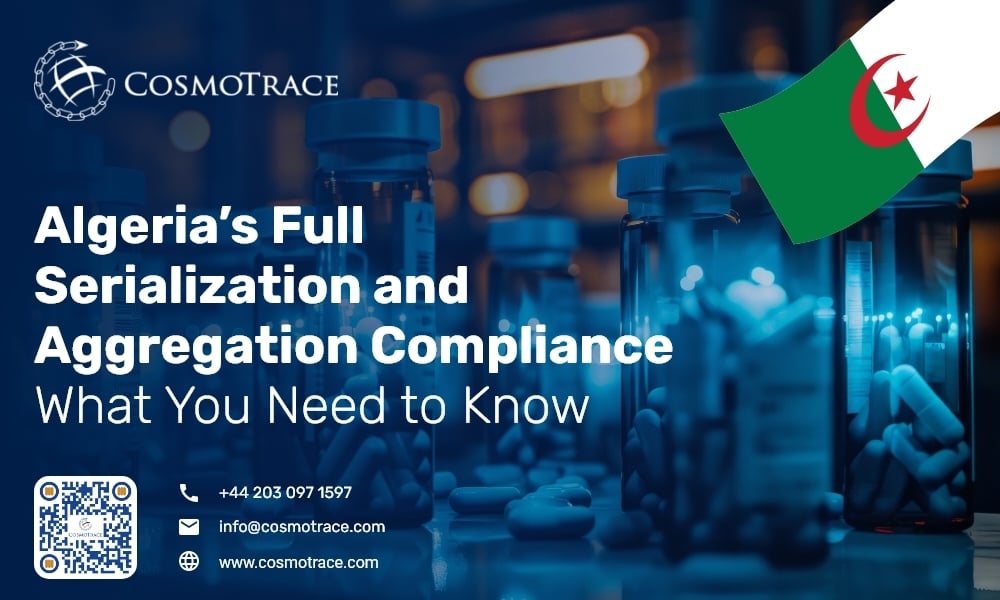Algeria’s ANPP Sets 2027 Deadline for Full Pharmaceutical Serialization and Aggregation Compliance. In a significant move to enhance pharmaceutical supply chain security and combat counterfeit drugs, Algeria’s National Agency for Pharmaceutical Products (ANPP) has officially announced a mandatory serialization and aggregation regulation set to take full effect on January 1, 2027. This regulatory development reflects a growing global trend toward improved traceability in the pharmaceutical sector and aligns Algeria with international best practices for drug safety and supply chain transparency.
Scope of the Mandate
The ANPP mandate applies to all pharmaceuticals marketed in Algeria, whether:
- Domestically manufactured, or
- Imported into the country.
This all-encompassing regulation is designed to ensure that every pharmaceutical product distributed within Algeria is verifiable, traceable, and protected against falsification or diversion.
Serialization & Aggregation Requirements
Pharmaceutical companies must adhere to GS1 standards and implement the following at different packaging levels: Unit Carton Level
Products must carry GS1compliant 2D DataMatrix barcodes that encode the following key data elements:
- GTIN (Global Trade Item Number)
- Unique Serial Number
- Batch Number
- Expiration Date
Aggregation is mandatory at higher packaging levels to maintain a digital link between parent and child packaging levels:
- Cases and pallets must be digitally aggregated to the serialized units they contain.
- This aggregation supports end-to-end visibility, enabling seamless tracking throughout the supply chain.
Implementation Roadmap
The ANPP has provided a phased roadmap to guide the pharmaceutical industry through this transformation. Here's a breakdown:
|
Timeline |
Milestone |
|
2024–2025 |
Preparatory phases, pilot implementations with selected manufacturers and importers |
|
By Jan 1, 2027 |
Mandatory serialization (DataMatrix with GTIN + serial + batch + expiry) and aggregation across all packaging levels |
|
Post‑2027 |
Implementation of electronic reporting (EPCIS) expected |
Implications for Industry Stakeholders
- Pharmaceutical manufacturers, importers, distributors, and logistics providers will need to:
- Upgrade packaging lines to apply and verify 2D DataMatrix codes.
- Implement or enhance IT systems for serialization data management and aggregation hierarchies.
- Train staff to operate within the new compliance framework.
- Collaborate with global and local partners to ensure seamless serialization across borders.
Global Alignment
With this announcement, Algeria joins a growing list of countries enforcing pharmaceutical serialization, such as:
- EU (Falsified Medicines Directive)
- S. (DSCSA)
- Russia (Chestny ZNAK)
- Saudi Arabia, UAE, Bahrain, Egypt, and others
This move not only safeguards Algerian patients but also enhances Algeria’s competitiveness in international pharmaceutical trade.
Conclusion
As the 2027 deadline approaches, stakeholders must act now to ensure compliance with ANPP’s serialization and aggregation requirements. Early preparation will not only mitigate the risk of noncompliance but also unlock benefits such as improved supply chain visibility, better inventory management, and increased patient safety.
The journey to full serialization is complex, but with a clear roadmap and global GS1 standards as a foundation, Algeria is setting a strong precedent for pharmaceutical traceability in North Africa.
How can CosmoTrace help?
We provide serialization consulting, implementation & integration services to help our clients with managing the end-to-end serialization projects and preparing them for the existing and upcoming regulations across the globe.
We are well versed with the compliance regulations for various markets and can help you with implementing the Algeria pharmaceutical serialization requirements.
Our team of experts strategize and plan end-to-end solutions using a combination of years of knowledge in product serialization, pharmaceutical supply chains, life sciences and brand integrity.
Disclaimer
This information is being provided ‘As Is’ with no claims of suitability for a particular purpose. It represents just one possible interpretation of information available in the public domain or through membership organizations, and that interpretation is subject to change. This information does not constitute legal advice. Users must refer to the source material for the complete requirements and form their own interpretation before making business decisions. Please use the references below to follow the updates at the source.

